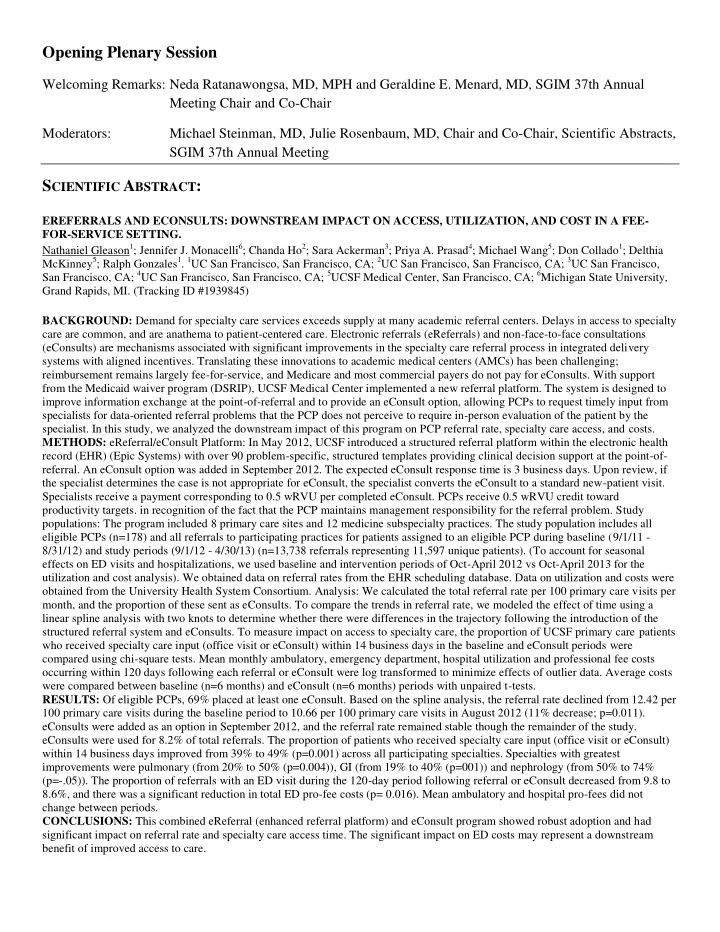

Opening Plenary Session Welcoming Remarks: Neda Ratanawongsa, MD, MPH and Geraldine E. Menard, MD, SGIM 37th Annual Meeting Chair and Co-Chair Moderators: Michael Steinman, MD, Julie Rosenbaum, MD, Chair and Co-Chair, Scientific Abstracts, SGIM 37th Annual Meeting S CIENTIFIC A BSTRACT : EREFERRALS AND ECONSULTS: DOWNSTREAM IMPACT ON ACCESS, UTILIZATION, AND COST IN A FEE- FOR-SERVICE SETTING. Nathaniel Gleason 1 ; Jennifer J. Monacelli 6 ; Chanda Ho 2 ; Sara Ackerman 3 ; Priya A. Prasad 4 ; Michael Wang 5 ; Don Collado 1 ; Delthia McKinney 5 ; Ralph Gonzales 1 . 1 UC San Francisco, San Francisco, CA; 2 UC San Francisco, San Francisco, CA; 3 UC San Francisco, San Francisco, CA; 4 UC San Francisco, San Francisco, CA; 5 UCSF Medical Center, San Francisco, CA; 6 Michigan State University, Grand Rapids, MI. (Tracking ID #1939845) BACKGROUND: Demand for specialty care services exceeds supply at many academic referral centers. Delays in access to specialty care are common, and are anathema to patient-centered care. Electronic referrals (eReferrals) and non-face-to-face consultations (eConsults) are mechanisms associated with significant improvements in the specialty care referral process in integrated delivery systems with aligned incentives. Translating these innovations to academic medical centers (AMCs) has been challenging; reimbursement remains largely fee-for-service, and Medicare and most commercial payers do not pay for eConsults. With support from the Medicaid waiver program (DSRIP), UCSF Medical Center implemented a new referral platform. The system is designed to improve information exchange at the point-of-referral and to provide an eConsult option, allowing PCPs to request timely input from specialists for data-oriented referral problems that the PCP does not perceive to require in-person evaluation of the patient by the specialist. In this study, we analyzed the downstream impact of this program on PCP referral rate, specialty care access, and costs. METHODS: eReferral/eConsult Platform: In May 2012, UCSF introduced a structured referral platform within the electronic health record (EHR) (Epic Systems) with over 90 problem-specific, structured templates providing clinical decision support at the point-of- referral. An eConsult option was added in September 2012. The expected eConsult response time is 3 business days. Upon review, if the specialist determines the case is not appropriate for eConsult, the specialist converts the eConsult to a standard new-patient visit. Specialists receive a payment corresponding to 0.5 wRVU per completed eConsult. PCPs receive 0.5 wRVU credit toward productivity targets. in recognition of the fact that the PCP maintains management responsibility for the referral problem. Study populations: The program included 8 primary care sites and 12 medicine subspecialty practices. The study population includes all eligible PCPs (n=178) and all referrals to participating practices for patients assigned to an eligible PCP during baseline (9/1/11 - 8/31/12) and study periods (9/1/12 - 4/30/13) (n=13,738 referrals representing 11,597 unique patients). (To account for seasonal effects on ED visits and hospitalizations, we used baseline and intervention periods of Oct-April 2012 vs Oct-April 2013 for the utilization and cost analysis). We obtained data on referral rates from the EHR scheduling database. Data on utilization and costs were obtained from the University Health System Consortium. Analysis: We calculated the total referral rate per 100 primary care visits per month, and the proportion of these sent as eConsults. To compare the trends in referral rate, we modeled the effect of time using a linear spline analysis with two knots to determine whether there were differences in the trajectory following the introduction of the structured referral system and eConsults. To measure impact on access to specialty care, the proportion of UCSF primary care patients who received specialty care input (office visit or eConsult) within 14 business days in the baseline and eConsult periods were compared using chi-square tests. Mean monthly ambulatory, emergency department, hospital utilization and professional fee costs occurring within 120 days following each referral or eConsult were log transformed to minimize effects of outlier data. Average costs were compared between baseline (n=6 months) and eConsult (n=6 months) periods with unpaired t-tests. RESULTS: Of eligible PCPs, 69% placed at least one eConsult. Based on the spline analysis, the referral rate declined from 12.42 per 100 primary care visits during the baseline period to 10.66 per 100 primary care visits in August 2012 (11% decrease; p=0.011). eConsults were added as an option in September 2012, and the referral rate remained stable though the remainder of the study. eConsults were used for 8.2% of total referrals. The proportion of patients who received specialty care input (office visit or eConsult) within 14 business days improved from 39% to 49% (p=0.001) across all participating specialties. Specialties with greatest improvements were pulmonary (from 20% to 50% (p=0.004)), GI (from 19% to 40% (p=001)) and nephrology (from 50% to 74% (p=-.05)). The proportion of referrals with an ED visit during the 120-day period following referral or eConsult decreased from 9.8 to 8.6%, and there was a significant reduction in total ED pro-fee costs (p= 0.016). Mean ambulatory and hospital pro-fees did not change between periods. CONCLUSIONS: This combined eReferral (enhanced referral platform) and eConsult program showed robust adoption and had significant impact on referral rate and specialty care access time. The significant impact on ED costs may represent a downstream benefit of improved access to care.
Recommend
More recommend